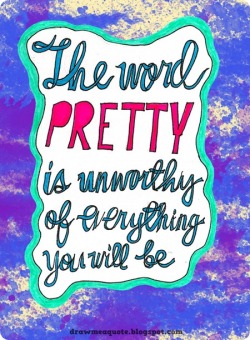|
A couple of months ago Universal Royalty announced that they were heading to Australia. That's right, the company of 'Toddlers and Tiaras' fame decided that Australia needed to glitz up their kids, and they were the people to help! But there was a strong voice of opposition in Australia, and many voiced outrage at the proposal. Catherine Manning founded Pull The Pin and rallies were held all around Australia to draw attention to the pageants and the the harm they cause. The Royal Australian and New Zealand College of Psychiatrists have backed calls for child beauty pageants to be banned, saying they encourage the sexualisation of children and can cause developmental harm. The chair of the college stated "We're giving these kids messages that how they appear, how they perform and standards about what they're to come up to is actually more important than what they're like inside." Catherine is an Enlighten Education colleague of mine, and last week when Universal Royalty announced they were also New Zealand-bound, Catherine asked me to coordinate the Pull The Pin campaign in New Zealand. I felt honoured to be asked, and set up the Pull The Pin NZ facebook page. We are campaigning to end all child beauty pageants in New Zealand. It is our view that pitting young girls against each other in a competition based on physical beauty is potentially harmful to their development, and can lead to lowered self esteem and other conditions including eating disorders and depression. We are also concerned with the adultification and sometimes sexualisation of pageant entrants, and their engagement in adult cosmetic treatments such as waxing and spray tanning. We are calling on the government to legislate to stop parents and pageant organisers from exploiting children by enforcing age restrictions on beauty pageants and adult cosmetic procedures (unless for medical reasons). We will be co-ordinating public rallies once we have more information on when and where these pageants will be held. It's been fantastic receiving so much support on this issue - it is definitely a topic that many New Zealanders feel strongly about! New Zealand media coverage over the last couple of days:
And if you needed any more convincing that these pageants are NOT something we want to become a part of kiwi culture, check out this video featuring Universal Royalty's Eden Wood:
10 Comments
There was widespread discussion about the ''I like..." Facebook craze last month. While I felt that this campaign sexualised breast cancer in a weird kinda way, NZ Girl's latest campaign has left me (nearly) speechless. Viewers are invited to "get your tits out for the girls!... and don't forget to check out the other lovely pairs, beautiful boobs and pretty titties already uploaded."
For every 50 pairs of "titties" uploaded by viewers, NZGirl will donate $1000 to breast cancer awareness. This campaign began yesterday and already there is a gallery of over 49 pairs of breasts to peruse, rank and comment on. Hmm, a gallery of "titties" ranked according to popularity and the ability for me to leave comments about them. How exactly is this different to a crude pornography site? NZGirl is exploiting women and girls in order to drive traffic to their website. It is making light of an horrific disease in order to gain popularity. It is belittling the experience of breast cancer sufferers, many of whom are left scarred or who have had to have their breasts removed. But in marketing terms, this campaign has been a resounding success - over 25,000 people visited the site this morning, crashing it. Boganette has written a great post on why NZGirl's campaign is oh-so-wrong: "Celebrate breasts, of course. But don't do it in the name of breast cancer. Breast cancer isn't about breasts. It's not something you should have a laugh about on Twitter. It's not something you should joke about on Facebook. It shouldn't be a reason for posting photos of your breasts or flashing them or 'getting them out'... Breast cancer is a horrible, miserable, horrifying disease - that's it. It's cancer - it's not motivation for you to be happy with your body." I hate the pretty-fying of breast cancer. The sexy-fying of breast cancer. Breast cancer is not sexy images of pert wee breasts. If you want to see the realities of breast cancer, check out The Scar Project. It's raw and it's real. There is nothing funny about it. According to Stuff: NZgirl editor and general manager Tee Twyford said the campaign wasn't about driving traffic to their site, but about raising awareness. "The reason for it was twofold. There was a desire to have readers feel really good about their breasts and we wanted to align it with a breast cancer cause to get greater awareness and funding," Twyford said. So, according to Tee Twyford, women need to share photos of their breasts with the world in order to feel good about themselves. We all need to seek external validation to make sure that our breasts are up to scratch, that they're OK. Dear Tee, please explain how being in the lower half of the rankings is going to help 50% of those women feel good about their breasts? Because Tee, in a rankings system, there is always a loser. And for the 'winners' in the top half of the rankings, are they supposed to feel great about themselves because a whole bunch of strangers have critiqued their breasts and given them a thumbs-up? Tee Twyford, I am not going to send your website a photo of my breasts. They are beautiful and I love them. But I don't need NZGirl to rank them and I don't need strangers to give me their comments about them. Because those strangers don't know that my breasts and I have been through lots together. Those strangers don't know or care that my breasts fed my baby and that I love them in all their uneven, stretch-marky, increasingly-less-pert glory. Or that it took me quite some time to learn to love them. Disturbingly, but not surprisingly, many of the breast photos that have been uploaded seem to be of teenagers. Through Enlighten Education I work with teen girls throughout New Zealand. I often have tears of sadness when talking with them about the immense pressures they face with regards to their body. New Zealand's rates of eating disorders and depression amongst teenagers are skyrocketing. Just yesterday I spent a morning with 150 gorgeous year 10 girls who all told me that they felt that they were not beautiful enough, not skinny enough and not perfect enough. It is campaigns such this one that add to the overwhelming pressure and sense for girls that they are just not enough. As soon as I have posted this I am going to email Tee Twyford to invite her to sit in on one of these sessions. Perhaps then she would realise the effects that such media campaigns have on our girls. Once photos are uploaded on to the internet, the owners cease to have any control over how they are used. To assume that these photos will not be used for pornographic purposes is naive. We teach girls to never upload compromising photos of themselves - why is a (previously) respected website encouraging them to do exactly this? Women, why are we doing this to each other? Are men rushing to upload photos of their penis to raise money for "cancer awareness"? NZGirl, if your motivation really is to raise money for breast cancer research I can think of a million more positive ways to do this. Even simpler: if you really want to donate to a good cause, just get out your credit card and donate. Simple. This video gives such a powerful message in such a simple way.  This is an extraordinarily powerful poetry performance by Katie Makkai defining the word "pretty", and the pressures faced by girls and women to define themselves by a narrow definition of "pretty". I love that it is calling for change and that it is raising awareness of the messages that mothers (and women in general) are passing on to their daughters. And the call to action at the end, a vow to her own 'someday- daughter' gave me goosebumps and tears. I invite you to watch the video below.  I was recently at a ‘style workshop’ and had been volunteered as one of the models to be 'made up' in front of an audience of business women – the goal was for me to be prepared (hair, makeup, clothes...) for a photographer to take some professional photos of me. I don’t consider myself very ‘stylish’ so it was a real treat! The presenter discussed having professional photos taken and the process of getting ready for them. She then added that with the wonders of photoshop, anything that wasn’t perfect could be fixed up. Until that moment, I hadn't ever considered photoshopping my own image. It was something that was done to celebrities and models. As I sat on the stage and looked at my image in the mirror, I suddenly saw the bags under the eyes, the crooked eyebrow... Hmmmm. The high-profile presenter was 50-ish, but joked that with the wonders of photoshop, she hadn’t really aged in the past 10 years and acknowledged that her publicity photos are a far cry from herself in ‘real life’. It got me thinking.
Do you have your image photoshopped? Why or why not? (PS: I have not ever had photos of me digitally altered. The main photo on my homepage is me complete with my smile-lines, forehead-creases and spots. But these are what make me, me. I have a red spot above my left eye which appeared in the first month of my pregnancy with my son (which resembles a pimple permanently threatening to break out... charming). It bugged me at first and I was assured it was hormonal and would disappear after the birth. Three years on, it has shown no sign of departing: but I like it. It is another mark on the journey of my life.)  We have mothers’ day, we have grandparents’ day, we have children’s day and we have teachers’ day. The proliferation of such days does get me a little cynical at times, but asides from the commercial aspect; they are all positive, loving days designed to honour a group in our community. This Friday we have ‘Hug-a-Ginga’ day, which seems to me to be to be a radio station’s big marketing stunt. Not being a commercial radio station listener, or a red-head, I hadn’t given much attention to this day in previous years. But this year the ‘Hug-a-Ginga’ concept has attracted a bigger debate, and this got me thinking. To me, ‘Hug-a-Anybody’ day gives the notion that this group is not used to being hugged, that on this one day of the year we should try and extend some charity and bless them with our sympathy. Transpose ‘ginga’ with any of the following: Pakeha, Maori, Fattie, Asian, Gay... you see my point. Is 'gingerism' the last acceptable prejudice? My adult red-headed friends take this day in good nature and play along and enjoy the comedy aspect and the extra attention. And I think this was probably how the day was intended to be ‘celebrated’. But my concern is for children. Red-headed kids cop more than their fair share of teasing as it is. Children ostracise those with differences and it is made worse when adults (indeed, media celebrities) are sanctioning and encouraging this bullying. This Friday, red-headed kids will have to play along with the ‘Hug-a-Ginga’ concept, or risk being further ostracised. I personally would feel violated if someone hugged me uninvited out of pity and charity. (And in schools, I can’t imagine many of these ‘Hug-a-Ginga’ acts will come from a position of love). With a bullying culture a real problem in most of our schools and a horrific youth suicide rate, is the promotion of prejudice based on genetics and the promotion of bullying based on hair colour really something to celebrate? |
AuthorRachel is a writer and educator whose fields of interest include sexuality education, gender, feminism and youth development. Archives
November 2023
Categories
All
|

 RSS Feed
RSS Feed




